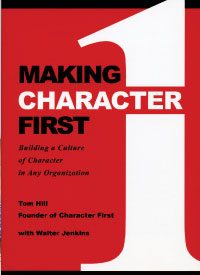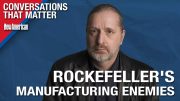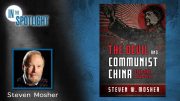
Character vs. Skills
Kimray, Inc. manufactures and distributes equipment for the oil and gas industry. Hill’s father-in-law, Garman Kimmell, founded the Oklahoma company in 1948, and many of their current products are the founder’s original patented inventions. (Kimmell is the subject of the “Americanist Entrepreneurs” article beginning on page 33 of this issue.) Hill has worked at Kimray since 1971, eventually assuming the lead from Kimmell. Today, Hill’s two sons serve as president and CEO.
But times have not always been sunny at Kimray. About 20 years ago when Hill was executive vice president, the company was groaning under debilitating personnel problems. They translated into low employee morale, exorbitant workers’ compensation costs, declining productivity, delayed deliveries, waning sales, and loss of market share to several new competitors.
At that point, Hill decided to stop attacking personnel problems as they arose. He believed they were only symptoms of the disease: a lack of character. “Emphasizing character would result in less reliance on rules and rule keepers,” reasoned Hill, allowing “our supervisors to focus on manufacturing issues instead of personnel problems.” He scrapped Kimray’s rule book, and “Hire for character — train for skills” became his revolutionary new motto.
Two years later workers’ comp costs had plummeted by 80 percent. Over the next few years, Kimray realized record profits, and its on-time delivery rate rose to more than 90 percent. The company has grown by an average of 25 percent in each of the last four years and has received awards from the Greater Oklahoma City Chamber and the Oklahoma Ethics Consortium. Hill credits making character first for his company’s unparalleled expansion. “It has truly repaired our culture and made the company great again,” declares Hill.
Yet Kimray is hardly an anomaly. As word spread, other companies implemented Hill’s professional development program, and their stories are equally encouraging. Character First is now a consulting company (www.characterfirst.com) with clients in more than two dozen countries. Business is not the only beneficiary; schools, government agencies, and prison systems have realized the positive effects of character education as well.
How Does It Work?
The book Making Character First is not just a sales pitch for the consulting company. It is also a “how to” manual containing fundamental principles on which Character First bases all of its customized programs. Hill and his colleagues developed a list of 49 character traits like attentiveness, compassion, and punctuality, and they recommend emphasizing one trait per month. This creates a corporate culture of consistent emphasis on character. Hill also designed Kimray’s job applications to reveal aspects of a candidate’s character during the interview process.
He came up with the idea of teaching, rewarding, and hiring employees in this way when he discovered that monetary compensation is not the key determinant of employee satisfaction, regardless of industry, background, or experience. What people want even more than a high salary is recognition and praise. He decided he would give them just that. Character First rewards employees’ good character with written documentation recognizing good character, which becomes a part of their permanent personnel files and is used in employee reviews and advancement -decisions.
It is interesting to note Hill discovered the way to cultivate high morals is to appeal to a person’s pride. That goes to show good can come even from catering to man’s base instincts. More noteworthy still is the way Hill has repackaged classic teaching on moral virtue and applied it in a practical and profitable way.
For example, he recognized one employee for initiative vs. idleness, defining the trait as “recognizing and doing what needs to be done before I am asked to do it.” The particular worker had researched a more resourceful way to track engineering changes at Kimray, streamlining the company’s process and saving hours of work. Instead of a simple attaboy, management gave him public recognition at its monthly meeting and placed a “Character Recognition Guide” in his personnel file. They will use it in making future decisions about promotion and raises.
This kind of recognition stimulates employees to even more resourcefulness and encourages co-workers to emulate the behavior. And this is a part of work employees can’t help taking home. Practicing virtue on a daily basis overflows into personal lives and transforms people and their families.
Nowhere is this more clearly illustrated than in the lives of Francisco and Margarita Cabrera, owners of Evento Integral, an event planning company in Mexico City. The pressures of building the business destroyed their marriage, though they remained business partners. More than a decade after divorcing, they implemented Character First. Not only did it transform the company, the Cabreras credit it with restoring their marriage. “We’ve been married 39 years,” beams Francisco, “including a 14-year vacation.”
Hill never mentions it, but Kimray’s turnaround is a playing out of the scriptural teaching, “Seek ye first the kingdom of God, and his justice, and all these things shall be added unto you” (Matthew 6:33). Or, in Hill’s own words, “Character determines success,” in personal life, at home, and in business.
Facing Criticism
There are those who may accuse Hill of self-righteousness or of exploiting his religious beliefs to make a profit. On the contrary, Making Character First is hardly a sectarian op-ed. It is obvious religion plays a major role in Hill’s life, but aside from two biblical quotes and brief mention of a Sunday school class, he makes no particular religious reference. The truth is he holds management’s feet, and particularly his own, closest to the fire. An excellent example stems from a piece of hate mail circulated at Kimray a couple of years after Character First started.
“Management seems to think that if they keep up the barrage of contentment tactics, it will eventually sink in and we will become happy little clones,” spat the anonymous employee. The letter accused Kimray of profiting at its employees’ expense, withholding raises, and fomenting discontent with its monthly character meetings.
Hill says he knew the letter was filled with lies, but Character First requires everyone, including the boss, to respond to criticism with patience and introspection. With his management team’s help, he painstakingly reviewed issues the letter raised. “We did find some problems in our timeframe and method of reviewing employees, and changes were enacted to correct them,” recalls Hill. “In our next employee meeting, we covered the shortcomings of our process, outlined our new procedures, and asked the employees for forgiveness.” Apparently, they got it; Kimray now boasts a Best Places to Work in Oklahoma award.
The Character Transformation
What distinguishes Character First from corporate ethics training is its focus on rewarding excellence rather than punishing violations, and its emphasis on the individual rather than the organization. When fear of punishment is the main motivating factor, questions like “Is it the right thing to do?” give way to “Can we get away with it?”
The answer is good character, which makes an individual demand virtue of himself no matter who is watching. Hill describes his book’s theme as “how cultural transformation takes place when individuals within an organization are transformed — one by one.” He calls his experience an adventure and closes by asking readers to join him in this bold undertaking.




